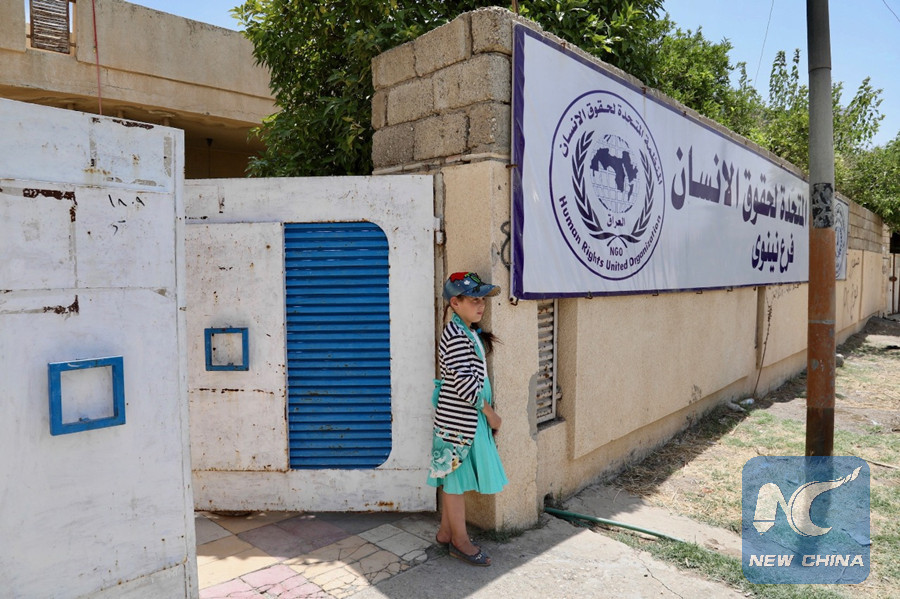
A girl whose father was captured by IS militants and went missing two years ago in Mosul, stands at the gate of the Human Rights United Organization in Nineveh Province, Iraq, on July 8, 2018. (Xinhua/Khalil Dawood)
MOSUL, Iraq, July 11 (Xinhua) -- Many Iraqi families are still living in limbo over the fate of their beloved members, who went missing during the ruthless rule of the Islamic State (IS) militant group over Mosul, second largest city in Iraq.
Many of the missing reportedly had been either killed by IS militants who used to shoot dead those trying to flee their homes in the battleground, or trapped in the IS-held areas in the densely-populated old city center and died as human shields.
However, the uprooted families from Mosul, which have been circulating between military units and humanitarian organizations, keep asking the same question: "Where is my husband?" "Where is my son?" or "Where is my father?"
The upshot is always the same: no answer.
Most of these families are suffering severe poverty after a painful tragedy for the loss of a primary breadwinner.
Among them is Firdous Mohammed who is waiting on the fate of her husband, her brother and her sister's husband. They were all captured by IS militants two years ago.
"I've lived in a very difficult situation since IS militants arrested my husband, brother and brother-in-law two years ago in Mosul," said Mohammed, a mother of two.
Mohammed, in her 40s, lives with two other women who also lost their family members, in a ruined small house in Mosul.
"We depend on humanitarian aid that we get from time to time from the United Nations and other relief organizations, as well as the help of some residents," she said.
The Iraqi woman said her husband was helping security members and government officials to flee Mosul after the extremist IS group seized the city.
"I myself participated in two attempts to help people flee the city until one day in 2016, there was an ambush and my husband was captured by the terrorists," she recalled.
Her husband was tortured in front of his eight-year-old son and six-year-old daughter, before she managed to flee the city with her two children for fear that IS militants would also persecute them.
"After two years of losing my husband, I'm still thinking of his suffering and pain under those merciless gangs. All I want to know is his fate because life is difficult and I need him with me," she said, embracing her 8-year-old daughter with tearful eyes.
Sami al-Faisal, head of Human Rights United Organization, who is working in Nineveh Province, said in an interview with Xinhua that IS militants kidnapped thousands of people, including security members, journalists, election candidates, government employees.
Faisal's organization established a database in coordination with Mosul's municipality council to register those who went missing after being kidnapped by the terrorist group.
"So far the database shows 2,178 have been registered as missing across the province, in addition to 3,111 others registered missing from Yazidi minority in the province," Faisal said.
"There are more missing people who are not registered because they live in distant places, or they are not aware about our activity," he added.
There are no accurate statistics from the Iraqi government about the number of missing people. Nevertheless, some unofficial reports estimated it at much higher than 11,000 since the fall of Mosul until its liberation.
Um Qusai, a woman from Wadi Hajar neighborhood in the western side of Mosul, told Xinhua that she lost her son during the liberation battles while he was imprisoned by IS militants.
"During the battles, the security forces captured him, and I have information that he was transferred to Baghdad," said Qusai, who also suffers abject poverty.
"Sometimes I ask myself why I didn't just die like many other people in the airstrikes. I am completely alone and desperate because nobody can help me know his fate," said Um Qusai, crying bitterly.
Faisal said his organization is keen to follow any information that could reveal the fate of those missing people.
Meanwhile, he blamed the central and provincial governments for failing to provide enough assistance for the traumatized families of the missing people, as most of the remaining family members are women and children.
"The problem is very serious, therefore I call on international community and the world's aid organizations to find a solution for these families and help them find their missing members first, and help them improve their living," Faisal said.
"It is almost impossible for the Iraqi government to meet the needs and demands of those people," he added.
A large part of Iraq's northern province of Nineveh, including its capital Mosul, came under IS control in June 2014, when government forces abandoned their weapons and fled, enabling IS militants to take control of parts of Iraq's northern and western regions.
On July 10, 2017, Iraqi Prime Minister Haider al-Abadi formally declared Mosul's liberation from the IS, after nearly nine months of fierce fighting to dislodge the extremist militants from their last major stronghold in Iraq.

